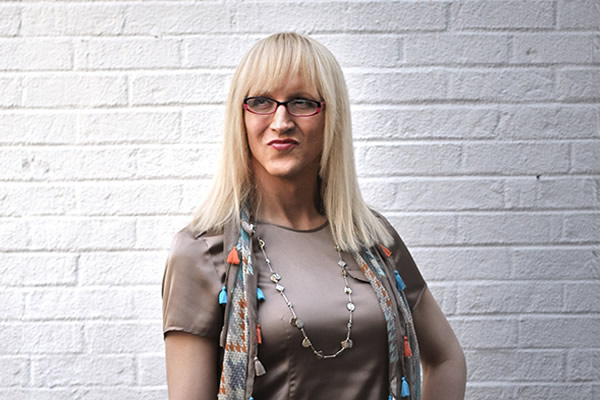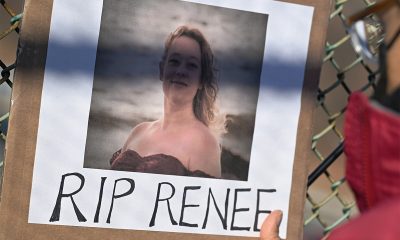National
Trans advocate picked to lead LGBT military group
Robinson says she had to ‘deny truths’ to continue service

Two organizations dedicated to assisting LGBT service members have merged to take on the issues of the post-“Don’t Ask, Don’t Tell” military and have designated a new leader who personifies a lingering inequity that remains for the armed forces.
OutServe-SLDN named as its new executive director Allyson Robinson — a 1994 graduate of the U.S. Military Academy at West Point who, as an Army officer, commanded PATRIOT missile units in Europe and the Middle East — as it officially completed its merger last week at its International Leadership Conference in Orlando, Fla.
The Scranton, Pa., native is a transgender veteran and the only openly transgender head of a major national organization dedicated to serving the LGBT community.
Speaking to the Washington Blade from the conference last week, Robinson said she didn’t transition until she left active duty, but still felt like she had to “deny truths” about herself during her service.
“I came from a military family and had that value of service above self, or service to the country that has given me so much,” Robinson said. “I had that value ingrained in me from the time I was a child. To be in a position in order to carry out that value, I had to violate another value that I held very deeply — that value of honestly and integrity. It was an ugly thing.”
Robinson said she didn’t identify as transgender while in service during the 1990s because at that time, she wasn’t aware of the terminology to describe her gender identity, although she was aware of pioneering leaders in the movement.
“I didn’t have language for what I experienced, or what my identity was because much of the language that we use today didn’t exist,” Robinson said. “But clearly, to steer into the heart of your question, I knew who I was. And I knew that in order to keep my career, and to serve the country I love, that I had to deny who I was.”
Unlike “Don’t Ask, Don’t Tell,” which was a law passed by Congress in 1993 to prevent openly gay people from serving in the military, the prohibition on openly transgender service is administrative. Those who identify as transgender are forced to take a medical discharge.
Robinson emphasized the difficulties that transgender people experience in concealing their identity while serving in the military.
“And in many ways, it’s even worse than the ‘Don’t Ask, Don’t Tell’ military because there is no ‘Don’t Ask, Don’t Tell,'” Robinson added. “People in the chain of command are completely authorized to ask, and if you don’t respond truthfully — if you perjure yourself — then there are penalties for that.”
Much in the same way LGBT advocates pointed to allied nations that allowed openly gay service during the effort to repeal “Don’t Ask, Don’t Tell,” Robinson said several allied countries have implemented openly transgender service with no adverse impact, including the United Kingdom, Great Britain and Australia.
Most recently, Robinson was the deputy director for employee programs at the HRC Foundation and drove the curricula designed to improve LGBT cultural competence in the workplace. She and her wife of 18 years live with their four children in Gaithersburg, Md.
Mara Keisling, executive director of the National Center for Transgender Equality, said she doesn’t have “in-depth” experience working with Robinson, but engaged with her in a limited capacity during her tenure at HRC.
“I think it’s about time we had a trans person running a non-trans national LGBT organization,” Keisling said. “But I’m assuming they hired her because of her talents and her experience and not because she’s trans, and not because that’s suddenly going to be the only thing they work on.”
Keisling added she hopes the appointment of Robinson will bring greater attention to the issue of transgender people being barred from service.
“That’s a very important issue for them to get to,” Keisling said. “There hasn’t yet been a lot of work on it and we need there to start being support on it, so I’m really hopeful about that.”
Robinson said the issue of transgender service is receiving greater attention and she wants more openly transgender service members and veterans to tell their stories to help enact change.
“This is so crucial,” Robinson said. “We saw it during the fight to repeal ‘Don’t Ask, Don’t Tell.’ It’s part of the work that we’re doing at OutServe-SLDN right now — getting out the stories of gay and lesbian service members who are still not receiving the same benefits, the same privileges as their straight counterparts. The stories are so crucial to winning these fights.”
At the same conference where the appointment of Robinson was formally announced, OutServe-SLDN came into existence as a result of the merger between two organizations: Servicemembers Legal Defense Network, which since 1993 has provided legal services to gay service members in the “Don’t Ask, Don’t Tell” era, and OutServe, which was founded as a Facebook group and rose to prominence during the fight to repeal the law.
SLDN’s board and OutServe’s board voted unanimously to complete the merger, which was first announced in July. Retired Navy Captain April Heinze, who previously served as co-chair of the SLDN board of directors will take the helm alongside Josh Seefried, co-founder and previously co-director of OutServe.
In a statement, Seefried said the merger would enable the groups to serve as a “strong, unified voice” before the Pentagon and White House on policy matters affecting gay service members.
“What began as a simple effort to tell our stories has grown into something we could never have imagined, and this combination represents the next step in that evolution,” Seefried said. “Each organization brings its own strengths to the fight for full LGBT military equality, and we are stronger together.”
Openly transgender service is but one of many goals that Robinson has said she wants to pursue as head of OutServe-SLDN. Also on the docket: getting the Pentagon to make an administrative change so gay service members with same-sex partners can obtain certain benefits; repeal of the Defense of Marriage Act so gay service members can offer health and pension benefits to their same-sex spouses; growth of the network of service members formerly under OutServe; and continuing to provide legal services to gay service members.
Still, for the big ticket items like equal benefits for troops and openly transgender service, Robinson said she wasn’t immediately able to offer a plan publicly to achieve those goals.
“I’ve been part of the work there at HRC for some time; we’re going to continue to work together,” Robinson said. “But in terms of what the specific strategies are, I don’t know that it’s in the movement’s advantage for me to put too many details out there.”
But as part of the effect to provide partner benefits to gay service members, Robinson said she wants to sit down with Pentagon leaders to ask them why they haven’t yet been implemented. At the time “Don’t Ask, Don’t Tell” was lifted last year, the Pentagon said it was going to examine these benefits — which include joint duty assignments, issuance of IDs, use of the commissary and family housing — but hasn’t yet taken action.
“The lives of gay and lesbian service members could be significantly improved — it couple happen today with a stroke of a pen — and yet, for some unfathomable reason, there is a dire lack of will to make that happen among the people whose charge it is to take care of service members and their families,” Robinson said. “I’m very, very eager to sit down with some of those people and ask them that very question.”
Robinson also said SLDN’s lawsuit against DOMA — McLaughlin v. Panetta — will remain a priority for the organization, even though the case has been halted at the district court level pending the outcome of the DOMA cases before the Supreme Court. Because of DOMA, gay service members are denied major benefits that can’t be implemented administratively, like health and pension benefits.
“DOMA hurts military families,” Robinson said. “And because of that, DOMA is a national security issue. And so, we see the repeal of the Defense of Marriage Act as something that is crucial not just to our members and their partners and their children, but that’s crucial to the security of this nation.”
And Robinson also said she plans to extend the network of LGBT service members under the organization from the more than 6,000 members in place and reach into the estimated 66,000 gay and lesbian troops that are currently in service.
“Just coming in from this chapter’s meeting that I’m in, I heard something from one of our leaders, our volunteer leaders that encouraged me,” Robinson said. “She said, ‘Our most important member is that young private, or young airmen out there — these are the lowest ranking soldiers in the U.S. military‚ who is gay, lesbian, bi or transgender and who doesn’t even know we exist and feels completely alone.’ As an organization, we exist for those people.”
U.S. Supreme Court
Competing rallies draw hundreds to Supreme Court
Activists, politicians gather during oral arguments over trans youth participation in sports

Hundreds of supporters and opponents of trans rights gathered outside of the United States Supreme Court during oral arguments for Little v. Hecox and West Virginia v. B.P.J. on Tuesday. Two competing rallies were held next to each other, with politicians and opposing movement leaders at each.
“Trans rights are human rights!” proclaimed U.S. Sen. Ed Markey (D-Mass.) to the crowd of LGBTQ rights supporters. “I am here today because trans kids deserve more than to be debated on cable news. They deserve joy. They deserve support. They deserve to grow up knowing that their country has their back.”

“And I am here today because we have been down this hateful road before,” Markey continued. “We have seen time and time again what happens when the courts are asked to uphold discrimination. History eventually corrects those mistakes, but only after the real harm is done to human beings.”
View on Threads
U.S. Education Secretary Linda McMahon spoke at the other podium set up a few feet away surrounded by signs, “Two Sexes. One Truth.” and “Reality Matters. Biology Matters.”
“In just four years, the Biden administration reversed decades of progress,” said McMahon. “twisting the law to urge that sex is not defined by objective biological reality, but by subjective notion of gender identity. We’ve seen the consequences of the Biden administration’s advocacy of transgender agendas.”

U.S. Rep. Mark Takano (D-Calif.), chair of the Congressional Equality Caucus, was introduced on the opposing podium during McMahon’s remarks.
“This court, whose building that we stand before this morning, did something quite remarkable six years ago.” Takano said. “It did the humanely decent thing, and legally correct thing. In the Bostock decision, the Supreme Court said that trans employees exist. It said that trans employees matter. It said that Title VII of the Civil Rights Act protects employees from discrimination based on sex, and that discrimination based on sex includes discrimination based on gender identity and sexual orientation. It recognizes that trans people have workplace rights and that their livelihoods cannot be denied to them, because of who they are as trans people.”
“Today, we ask this court to be consistent,” Takano continued. “If trans employees exist, surely trans teenagers exist. If trans teenagers exist, surely trans children exist. If trans employees have a right not to be discriminated against in the workplace, trans kids have a right to a free and equal education in school.”
Takano then turned and pointed his finger toward McMahon.
“Did you hear that, Secretary McMahon?” Takano addressed McMahon. “Trans kids have a right to a free and equal education! Restore the Office of Civil Rights! Did you hear me Secretary McMahon? You will not speak louder or speak over me or over these people.”
Both politicians continued their remarks from opposing podiums.
“I end with a message to trans youth who need to know that there are adults who reject the political weaponization of hate and bigotry,” Takano said. “To you, I say: you matter. You are not alone. Discrimination has no place in our schools. It has no place in our laws, and it has no place in America.”
U.S. Supreme Court
Supreme Court hears arguments in two critical cases on trans sports bans
Justices considered whether laws unconstitutional under Title IX.

The Supreme Court heard two cases today that could change how the Equal Protection Clause and Title IX are enforced.
The cases, Little v. Hecox and West Virginia v. B.P.J., ask the court to determine whether state laws blocking transgender girls from participating on girls’ teams at publicly funded schools violates the 14th Amendment’s Equal Protection Clause and Title IX. Once decided, the rulings could reshape how laws addressing sex discrimination are interpreted nationwide.
Chief Justice John Roberts raised questions about whether Bostock v. Clayton County — the landmark case holding that Title VII of the Civil Rights Act of 1964 protects employees from discrimination based on sexual orientation or gender identity — applies in the context of athletics. He questioned whether transgender girls should be considered girls under the law, noting that they were assigned male at birth.
“I think the basic focus of the discussion up until now, which is, as I see it anyway, whether or not we should view your position as a challenge to the distinction between boys and girls on the basis of sex or whether or not you are perfectly comfortable with the distinction between boys and girls, you just want an exception to the biological definition of girls.”
“How we approach the situation of looking at it not as boys versus girls but whether or not there should be an exception with respect to the definition of girls,” Roberts added, suggesting the implications could extend beyond athletics. “That would — if we adopted that, that would have to apply across the board and not simply to the area of athletics.”
Justice Clarence Thomas echoed Roberts’ concerns, questioning how sex-based classifications function under Title IX and what would happen if Idaho’s ban were struck down.
“Does a — the justification for a classification as you have in Title IX, male/female sports, let’s take, for example, an individual male who is not a good athlete, say, a lousy tennis player, and does not make the women’s — and wants to try out for the women’s tennis team, and he said there is no way I’m better than the women’s tennis players. How is that different from what you’re being required to do here?”
Justice Samuel Alito addressed what many in the courtroom seemed reluctant to state directly: the legal definition of sex.
“Under Title IX, what does the term ‘sex’ mean?” Alito asked Principal Deputy Solicitor General Hashim Mooppan, who was arguing in support of Idaho’s law. Mooppan maintained that sex should be defined at birth.
“We think it’s properly interpreted pursuant to its ordinary traditional definition of biological sex and think probably given the time it was enacted, reproductive biology is probably the best way of understanding that,” Mooppan said.
Justice Sonia Sotomayor pushed back, questioning how that definition did not amount to sex discrimination against Lindsay Hecox under Idaho law. If Hecox’s sex is legally defined as male, Sotomayor argued, the exclusion still creates discrimination.
“It’s still an exception,” Sotomayor said. “It’s a subclass of people who are covered by the law and others are not.”
Justice Elena Kagan highlighted the broader implications of the cases, asking whether a ruling for the states would impose a single definition of sex on the 23 states that currently have different laws and standards. The parties acknowledged that scientific research does not yet offer a clear consensus on sex.
“I think the one thing we definitely want to have is complete findings. So that’s why we really were urging to have a full record developed before there were a final judgment of scientific uncertainty,” said Kathleen Harnett, Hecox’s legal representative. “Maybe on a later record, that would come out differently — but I don’t think that—”

“Just play it out a little bit, if there were scientific uncertainty,” Kagan responded.
Justice Brett Kavanaugh focused on the impact such policies could have on cisgender girls, arguing that allowing transgender girls to compete could undermine Title IX’s original purpose.
“For the individual girl who does not make the team or doesn’t get on the stand for the medal or doesn’t make all league, there’s a — there’s a harm there,” Kavanaugh said. “I think we can’t sweep that aside.”
Justice Amy Coney Barrett questioned whether Idaho’s law discriminated based on transgender status or sex.
“Since trans boys can play on boys’ teams, how would we say this discriminates on the basis of transgender status when its effect really only runs towards trans girls and not trans boys?”
Harnett responded, “I think that might be relevant to a, for example, animus point, right, that we’re not a complete exclusion of transgender people. There was an exclusion of transgender women.”
Justice Ketanji Brown Jackson challenged the notion that explicitly excluding transgender people was not discrimination.
“I guess I’m struggling to understand how you can say that this law doesn’t discriminate on the basis of transgender status. The law expressly aims to ensure that transgender women can’t play on women’s sports teams… it treats transgender women different than — than cis-women, doesn’t it?”
Idaho Solicitor General Alan Hurst urged the court to uphold his state’s ban, arguing that allowing participation based on gender identity — regardless of medical intervention — would deny opportunities to girls protected under federal law.
Hurst emphasized that biological “sex is what matters in sports,” not gender identity, citing scientific evidence that people assigned male at birth are predisposed to athletic advantages.
Joshua Block, representing B.P.J., was asked whether a ruling in their favor would redefine sex under federal law.
“I don’t think the purpose of Title IX is to have an accurate definition of sex,” Block said. “I think the purpose is to make sure sex isn’t being used to deny opportunities.”
Becky Pepper-Jackson, identified as plaintiff B.P.J., the 15-year-old also spoke out.
“I play for my school for the same reason other kids on my track team do — to make friends, have fun, and challenge myself through practice and teamwork,” said Pepper-Jackson. “And all I’ve ever wanted was the same opportunities as my peers. But in 2021, politicians in my state passed a law banning me — the only transgender student athlete in the entire state — from playing as who I really am. This is unfair to me and every transgender kid who just wants the freedom to be themselves.”

Outside the court, advocates echoed those concerns as the justices deliberated.
“Becky simply wants to be with her teammates on the track and field team, to experience the camaraderie and many documented benefits of participating in team sports,” said Sasha Buchert, counsel and Nonbinary & Transgender Rights Project director at Lambda Legal. “It has been amply proven that participating in team sports equips youth with a myriad of skills — in leadership, teamwork, confidence, and health. On the other hand, denying a student the ability to participate is not only discriminatory but harmful to a student’s self-esteem, sending a message that they are not good enough and deserve to be excluded. That is the argument we made today and that we hope resonated with the justices of the Supreme Court.”
“This case is about the ability of transgender youth like Becky to participate in our schools and communities,” said Joshua Block, senior counsel for the ACLU’s LGBTQ & HIV Project. “School athletics are fundamentally educational programs, but West Virginia’s law completely excluded Becky from her school’s entire athletic program even when there is no connection to alleged concerns about fairness or safety. As the lower court recognized, forcing Becky to either give up sports or play on the boys’ team — in contradiction of who she is at school, at home, and across her life — is really no choice at all. We are glad to stand with her and her family to defend her rights, and the rights of every young person, to be included as a member of their school community, at the Supreme Court.”
The Supreme Court is expected to issue rulings in both cases by the end of June.
U.S. Supreme Court
As Supreme Court weighs trans sports bans, advocate and former athlete speaks out
PFLAG staffer Diego Sanchez competed at University of Georgia in 1970s

The U.S. Supreme Court will hear two cases Tuesday addressing the legality of banning transgender women and girls from participating in sports under the 14th Amendment.
Though the two cases differ slightly in their fact patterns, they ultimately pose the same constitutional question: whether laws that limit participation in women’s sports to only cisgender women and girls violate the Equal Protection Clause of the 14th Amendment.
In both cases — Little v. Hecox and West Virginia v. B.P.J. — trans girls filed lawsuits against their respective states, Idaho and West Virginia, arguing that the bans violate their right to equal protection under the law by subjecting them to different standards than cisgender girls.
Lindsay Hecox, now 24, filed her lawsuit in 2020 while attending Boise State University. That same year, Idaho enacted the “Fairness in Women’s Sports Act,” which barred trans women from participating in any sport in public schools, from kindergarten through college. Although Hecox underwent hormone therapy that significantly lowered her testosterone levels, she was still excluded under the law when she attempted to try out for the women’s track and cross-country teams.
The second case centers on B.P.J., a 15-year-old trans girl who has identified as female since third grade and has been on puberty blockers since the onset of puberty. In 2021, West Virginia enacted the “Save Women’s Sports Act,” which requires sports teams to be designated by “biological sex” rather than gender identity. B.P.J.’s mother filed suit on her behalf after her daughter was barred from participating on her school’s girls’ cross-country and track teams.
A key distinction between the two cases is that attorneys for B.P.J. have argued that because puberty blockers were part of her development, her body is more aligned with that of a cisgender girl than a cisgender boy. Despite these differences, both cases raise the same constitutional issue: whether it is lawful to bar someone from participation in sports based on sex assigned at birth.
The Washington Blade spoke with PFLAG Vice President of Policy and Government Affairs Diego Sanchez.
Sanchez is a trans elder with firsthand experience as a college athlete at the University of Georgia and later became the first openly trans legislative staff member on Capitol Hill.
His dual experience — as a former athlete and a longtime policy expert deeply familiar with constitutional law — gives him a unique perspective on the questions now before the Supreme Court. Sanchez will also be one of the featured speakers at a rally on the steps of the court as the justices hear arguments.
When asked how attitudes toward trans athletes differ from when he competed at the University of Georgia from 1976-1980 to today — when 27 states have passed laws restricting trans participation in sports — Sanchez said the contrast is stark.
“I had the good experience of being supported by my teammates and my coach,” Sanchez said. “The thing that’s so different today is that these [trans] kids are able to go home and get kisses and hugs from their parents, being lauded in the stands by their families, and then being told that who they are doesn’t necessarily fit with who they’re allowed to be in their expression at the moment, and that to me, seems a terrible injustice.”
Sanchez emphasized that sports offer lessons that extend far beyond competition.
“When you’re an athlete, you learn an awful lot of things about life,” he said. “You learn about leadership, but you also learn that your best effort becomes part of a team effort … how you feel as an individual contributor is affected by what ends up being part of how you live your life as an adult.”
After his time as an athlete, Sanchez began working in government, eventually serving as senior policy advisor to then-U.S. Rep. Barney Frank (D-Mass.) until Frank’s retirement in 2013. Sanchez said that one of the most important aspects of his role was simply being visible as a trans person in spaces where many lawmakers had never knowingly met one before.
“My job was to make sure that no one, no legislator, could say that they had never met a trans person,” Sanchez said.
Sanchez also addressed the broader implications the Supreme Court’s decision could have on how gender is treated within institutional systems.
“I don’t think it affects how people perceive their own gender or express their own gender, but I do think that it could create barriers if it doesn’t welcome the way that community and society actually are,” he said. “The most important thing for people to know … is to remember that every person is an individual, and that the right to contribute to society should be something that is supported by the government, not hindered.”
He added that the court’s role must be understood within the framework of checks and balances established by the Constitution.
“The risk, of course, here is always remembering that we have three branches of government, so that this action by the judiciary branch may or may not have implications on whether or how things can be perceived or executed at other branches,” Sanchez said. “I would hope that our government is interested in letting the future generations and current generations be the best that they can be as well.”
“Do people get to live their lives as they are, or is the government an obstruction or a support?”
When asked what message he would share with young trans athletes watching the Supreme Court take up these cases, Sanchez said community support remains critical, regardless of how the justices rule.
“Make sure that the environment that you put yourself in is something that honors who you know you are and supports you becoming the best person you can be, and that anything that takes away from that is purely dissonance,” he said.
“What we do with dissonance is what distinguishes us as whether we excel or doubt.”
That same sense of community, Sanchez said, is what rallies — like the one planned outside the Supreme Court — are meant to reinforce, even as decisions are made inside the building.
“Rallies, including tomorrow’s, are about people knowing they’re not alone, and hearing from other people who support who they are,” he said. “There is support across the country … I wish that I had had someone my age now that I could have looked to, but I am the role model, but I didn’t have any.”
Looking ahead to the possibility that the court could uphold bans on trans athletes, Sanchez said the immediate challenge will be ensuring that families and communities continue to affirm trans youth amid legal uncertainty.
“Having the endorsement of being supported who you are, it helps you so much,” he said. “You cannot put the issue of rights back into the genie’s bottle once people experience what freedom and welcoming is.”
For Sanchez, whose life has spanned decades of change in both sports and government, the cases before the Supreme Court represent a pivotal moment — not just legally, but culturally.
“Living your life, for me, does not require bravery,” he said. “It’s just taking one step and then another.”




















